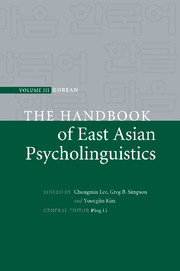Book contents
- Frontmatter
- Contents
- List of figures
- List of tables
- List of contributors
- Preface
- Introduction: Advances in Korean psycholinguistics
- Part I Language acquisition
- 1 Acquisition of the subject and topic nominals and markers in the spontaneous speech of young children in Korean
- 2 The acquisition of argument structure and transitivity in Korean: a discourse-functional approach
- 3 Acquisition of case markers and grammatical functions
- 4 Do Korean children acquire verbs earlier than nouns?
- 5 The acquisition of the placement of the verb in the clause structure of Korean
- 6 Learning locative verb syntax: a crosslinguistic experimental study
- 7 Language-specific spatial semantics and cognition: developmental patterns in English and Korean
- 8 Acquisition of negation in Korean
- 9 The acquisition of Korean numeral classifiers
- 10 Acquisition of Korean reflexive anaphora
- 11 The Korean relative clause: issues of processing and acquisition
- 12 The accessibility hierarchy in Korean: head-external and head-internal relative clauses
- 13 Development of functional categories in child Korean
- 14 The acquisition of modality
- 15 The syntax of overmarking and kes in child Korean
- 16 Events in passive development
- 17 Universal quantification in child grammar
- 18 Acquisition of prosody in Korean
- 19 Korean as a heritage language
- 20 Maturational effects on L2 acquisition
- 21 L2 acquisition of English articles by Korean speakers
- 22 The acquisition of wanna contraction by adult Korean learners of English
- 23 Phonological abilities of Korean–English bilinguals
- 24 Parameters on languages in contact: an altered view of codeswitching
- 25 Influence of socio-psychological categories in bilingual interaction
- 26 Ontological concept versus shape in word learning from a crosslinguistic point of view
- 27 Notes on Korean Sign Language
- Part II Language processing
- References
- Name index
- Subject index
16 - Events in passive development
from Part I - Language acquisition
Published online by Cambridge University Press: 05 June 2012
- Frontmatter
- Contents
- List of figures
- List of tables
- List of contributors
- Preface
- Introduction: Advances in Korean psycholinguistics
- Part I Language acquisition
- 1 Acquisition of the subject and topic nominals and markers in the spontaneous speech of young children in Korean
- 2 The acquisition of argument structure and transitivity in Korean: a discourse-functional approach
- 3 Acquisition of case markers and grammatical functions
- 4 Do Korean children acquire verbs earlier than nouns?
- 5 The acquisition of the placement of the verb in the clause structure of Korean
- 6 Learning locative verb syntax: a crosslinguistic experimental study
- 7 Language-specific spatial semantics and cognition: developmental patterns in English and Korean
- 8 Acquisition of negation in Korean
- 9 The acquisition of Korean numeral classifiers
- 10 Acquisition of Korean reflexive anaphora
- 11 The Korean relative clause: issues of processing and acquisition
- 12 The accessibility hierarchy in Korean: head-external and head-internal relative clauses
- 13 Development of functional categories in child Korean
- 14 The acquisition of modality
- 15 The syntax of overmarking and kes in child Korean
- 16 Events in passive development
- 17 Universal quantification in child grammar
- 18 Acquisition of prosody in Korean
- 19 Korean as a heritage language
- 20 Maturational effects on L2 acquisition
- 21 L2 acquisition of English articles by Korean speakers
- 22 The acquisition of wanna contraction by adult Korean learners of English
- 23 Phonological abilities of Korean–English bilinguals
- 24 Parameters on languages in contact: an altered view of codeswitching
- 25 Influence of socio-psychological categories in bilingual interaction
- 26 Ontological concept versus shape in word learning from a crosslinguistic point of view
- 27 Notes on Korean Sign Language
- Part II Language processing
- References
- Name index
- Subject index
Summary
Introduction
Children's difficulty with passives is well known in various languages (Maratsos et al., 1985, Gordon & Chafetz, 1990, and Fox & Grodzinsky, 1998 for English; Pierce, 1992 for Spanish; Sano, 2000 for Japanese; Bartke, 2004 for German; Terzi & Wexler, 2002 for Greek, among others), but the source of difficulty is still an open question. There are two competing accounts for the late development of passives, proposed for English but extendable to other languages. One is Borer and Wexler's (1987) A-chain Maturation Hypothesis, which says children cannot handle A-chains (i.e. movement from object to subject positions) until a certain age of maturation. Due to this inability, children adopt an alternative structure that does not involve an A-chain, namely that of adjectival passives. The other is Fox and Grodzinsky's (1998) Theta Transmission Account. They claim that children's difficulty has nothing to do with A-chains, but with theta transmission. Children cannot transmit the external theta-role to the by-phrase in passives, and they come to interpret the by-phrase by default Agent assignment.
One question arising from the above discussion is what the two hypotheses predict for languages whose passive formation does not involve an A-chain or theta transmission; in other words, for languages like Korean. If children have difficulty either with A-chains or with theta transmission, it is predicted that passives in languages that have neither should be easier to acquire than passives in languages that have both.
- Type
- Chapter
- Information
- The Handbook of East Asian Psycholinguistics , pp. 231 - 243Publisher: Cambridge University PressPrint publication year: 2009



